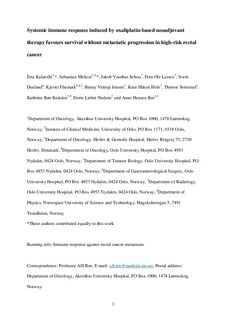| dc.contributor.author | Kalanxhi, Ert | |
| dc.contributor.author | Meltzer, Sebastian | |
| dc.contributor.author | Schou, Jakob Vasehus | |
| dc.contributor.author | Larsen, Finn Ole | |
| dc.contributor.author | Dueland, Svein | |
| dc.contributor.author | Flatmark, Kjersti | |
| dc.contributor.author | Jensen, Benny Vittrup | |
| dc.contributor.author | Hole, Knut Håkon | |
| dc.contributor.author | Seierstad, Therese | |
| dc.contributor.author | Redalen, Kathrine | |
| dc.contributor.author | Nielsen, Dorte Lisbet | |
| dc.contributor.author | Ree, Anne Hansen | |
| dc.date.accessioned | 2019-01-07T08:38:24Z | |
| dc.date.available | 2019-01-07T08:38:24Z | |
| dc.date.created | 2018-06-29T13:57:56Z | |
| dc.date.issued | 2018 | |
| dc.identifier.citation | British Journal of Cancer. 2018, 118 (10), 1322-1328. | nb_NO |
| dc.identifier.issn | 0007-0920 | |
| dc.identifier.uri | http://hdl.handle.net/11250/2579379 | |
| dc.description.abstract | Background
Systemic failure remains a challenge in rectal cancer. We investigated the possible systemic anti-tumour immune activity invoked within oxaliplatin-based neoadjuvant therapy.
Methods
In two high-risk patient cohorts, we assessed the circulating levels of the fms-like tyrosine kinase 3 ligand (Flt3L), a factor reflecting both therapy-induced myelosuppression and activation of tumour antigen-presenting dendritic cells, at baseline and following induction chemotherapy and sequential chemoradiotherapy, both modalities containing oxaliplatin. The primary end point was progression-free survival (PFS).
Results
In both cohorts, the median Flt3L level was significantly higher at completion of each sequential modality than at baseline. The 5-year PFS (most events being metastatic progression) was 68% and 71% in the two cohorts consisting of 33% and 52% T4 cases. In the principal cohort, a high Flt3L level following the induction chemotherapy was associated with low risk for a PFS event (HR: 0.15; P < 0.01). These patients also had available dose scheduling and toxicity data, revealing that oxaliplatin dose reduction during chemoradiotherapy, undertaken to maintain compliance to the radiotherapy protocol, was associated with advantageous PFS (HR: 0.47; P = 0.046).
Conclusion
In high-risk rectal cancer, oxaliplatin-containing neoadjuvant therapy may promote an immune response that favours survival without metastatic progression. | nb_NO |
| dc.language.iso | eng | nb_NO |
| dc.publisher | Springer Verlag | nb_NO |
| dc.title | Systemic immune response induced by oxaliplatin-based neoadjuvant therapy favours survival without metastatic progression in high-risk rectal cancer | nb_NO |
| dc.type | Journal article | nb_NO |
| dc.type | Peer reviewed | nb_NO |
| dc.description.version | acceptedVersion | nb_NO |
| dc.source.pagenumber | 1322-1328 | nb_NO |
| dc.source.volume | 118 | nb_NO |
| dc.source.journal | British Journal of Cancer | nb_NO |
| dc.source.issue | 10 | nb_NO |
| dc.identifier.doi | 10.1038/s41416-018-0085-y | |
| dc.identifier.cristin | 1594800 | |
| dc.description.localcode | This is a post-peer-review, pre-copyedit version of an article published in [British Journal of Cancer]. The final authenticated version is available online at: https://doi.org/10.1038/s41416-018-0085-y | nb_NO |
| cristin.unitcode | 194,66,20,0 | |
| cristin.unitname | Institutt for fysikk | |
| cristin.ispublished | true | |
| cristin.fulltext | postprint | |
| cristin.qualitycode | 2 | |
